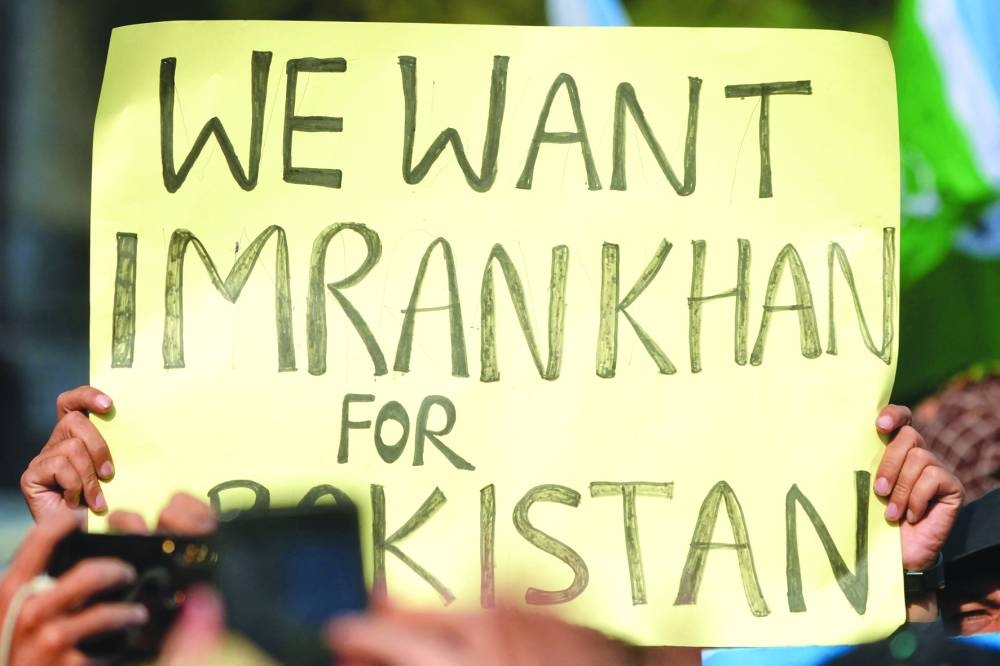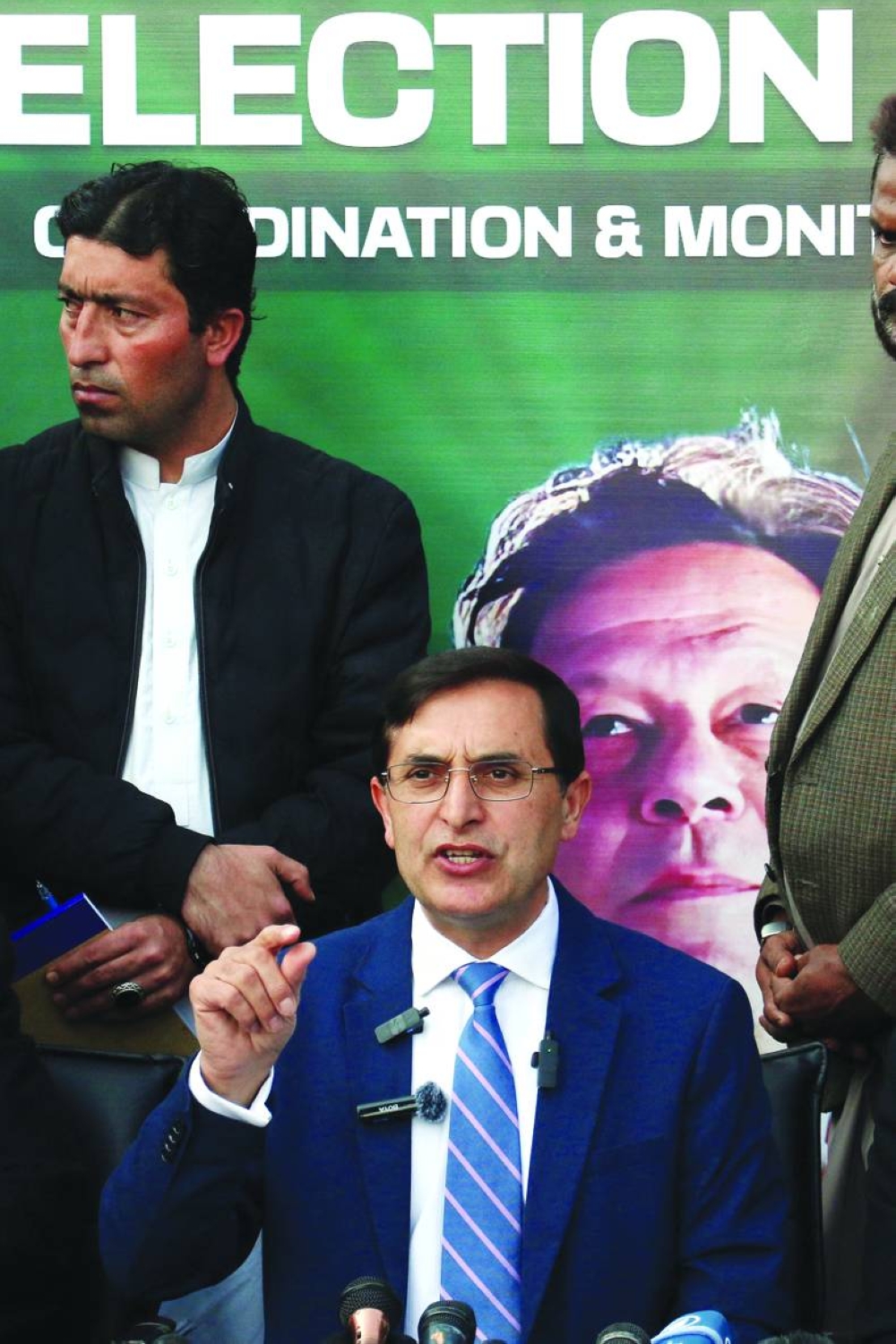Candidates backed by the party of jailed Pakistani opposition leader Imran Khan plan to form a government, a senior aide to the former prime minister said yesterday, urging supporters to peacefully protest if final election results are not released.
The nation of 241mn people voted on Thursday in a general election, as the country struggles to recover from an economic crisis and battles militant violence in a deeply polarised political environment.
Both Khan and his main rival, three-time former prime minister Nawaz Sharif, declared victory on Friday, increasing uncertainty over who will form the next government at a time when swift policy action is needed to address multiple challenges.
Gohar Khan, the chairman of Khan’s Pakistan Tehreek-e-Insaf (PTI) party who also acts as the former prime minister’s lawyer, called on “all institutions” in Pakistan to respect his party’s mandate.
At a press conference, he said if complete results of the polls were not released by yesterday night, the party would hold peaceful protests today outside government offices returning election results around the country.
Hundreds of Khan’s supporters rallied in the northwestern city of Peshawar led by two of his aides who said they had been declared losers despite having won the polls.
“We never expected it would happen to us,” said Taimur Khan Jhagra, one of Khan’s former provincial ministers.
The protesters chanted slogans against what they called a vote fraud.
Sharif said on Friday his party had emerged as the single largest group and would talk to other groups to form a coalition government. By 5pm yesterday, results were still not in for 10 of the 265 seats contested in the election — 48 hours after the polls closed.
The latest tally, posted on the Election Commission’s website, showed independent candidates had won 100 seats, with Sharif’s Pakistan Muslim League - Nawaz (PML-N) taking 72 seats and Pakistan People’s Party (PPP) 54.
Khan’s supporters were running as independents because they had been barred from contesting the polls under his party’s electoral symbol by the Election Commission under flimsy pretext of not complying with electoral laws.
Despite the ban and Khan’s imprisonment for convictions on charges ranging from “leaking state secrets to corruption to an unlawful marriage”, millions of the former cricketer’s supporters came out to vote for him, even though he cannot be part of any government while he remains in prison.
However, under Pakistan’s electoral laws, independent candidates are not eligible to be allocated reserved seats, 70 of which are meant to be distributed according to party strength. Sharif’s party could get up to 20 of these seats.
Khan’s close aide and media adviser, Zulfi Bukhari, told Reuters the party would announce within the next day the party banner they will ask independents to join. In Pakistan, independent candidates cannot form a government on their own and need to join a party.
“And we have no fear of independents going anywhere, because these are the people who have struggled for the last 18 months and endured all kinds of torture and oppression,” Bukhari told Reuters in a WhatsApp voice message.
Whoever seeks to form the next government would need support from other parties with no-one close to the seat threshold for a simple majority in parliament.
“We don’t have enough of a majority to run the government ourselves, therefore we invite the other parties and candidates who have been successful to work with us,” former three-time premier Nawaz Sharif said at his party headquarters in the city.
In an AI-generated video produced by PTI, Khan was credited as claiming victory for the party.
“According to independent sources, we were winning 150 National Assembly seats before the rigging started,” said the message posted on his X account, which featured a genuine video clip of him from a year ago and an AI-generated voice-over.
Most of the seats won by Khan loyalists were in Khyber Pakhtunkhwa, where police said at least two PTI supporters were killed Friday and more than 20 wounded when they protested against alleged vote-rigging in Shangla district — the first serious post-election violence reported.
Several small, scattered protests by PTI supporters were reported across the country yesterday.
A nationwide election-day mobile telephone blackout and the slow counting of results led to suspicions the military establishment was influencing the process to ensure Sharif’s success.
“PTI as a party and political group, despite significant efforts by the civilian and military establishment, has held on to its vote bank,” said Bilal Gilani, executive director of polling group Gallup Pakistan. “It shows that the military does not always get their way — that is the silver lining,” he told AFP.
The PPP, whose popularity is largely limited to its Sindh heartland, also did better than expected.
The PML-N and PPP joined forces with minor parties to controversially remove Khan from office in April 2022 after his PTI won a slender majority in the 2018 election.
The former international cricketer then waged an unprecedented campaign of defiance against the military-led establishment, which originally backed his rise to power.
“No-one can form a government without us,” Bhutto-Zardari told local Geo TV.
Pakistan’s army chief congratulated the country yesterday for the “successful conduct” of the election, saying the nation needed “stable hands” to move on from the politics of “anarchy and polarisation”.
The military remains the country’s most powerful institution and has for decades had a huge role in making and breaking governments. Khan accuses the military of a brutal crackdown on him and his party.
The United States, Britain and the European Union on Friday each expressed concerns about the electoral process, urging a probe into reported irregularities.
British Foreign Secretary David Cameron cited “serious concerns” that raised questions “about the fairness and lack of inclusivity of the elections”.
Pakistan’s Foreign Office responded to the comments yesterday, saying they ignored the “undeniable fact” that the election had been successfully conducted.
“It is our hope that the process will be concluded effectively and it will reflect the will of the people,” said former Nigerian president Goodluck Jonathan, who is leading the Commonwealth team to observe the voting.
International
Khan’s party aims to form govt in Centre
* PTI-backed independents won most seats in the national electionn Army chief hails ‘successful polls’ n Global criticism rejected

A supporter of PTI holds a plccard during a protest outside an Election Commission office in Karachi amid claims the election result delay is allowing authorities to rig the vote-counting. (AFP)

Pakistan Tehreek-e-Insaf (PTI) party’s chief Gohar Khan gestures during a press conference in Islamabad yesterday. (AFP)
